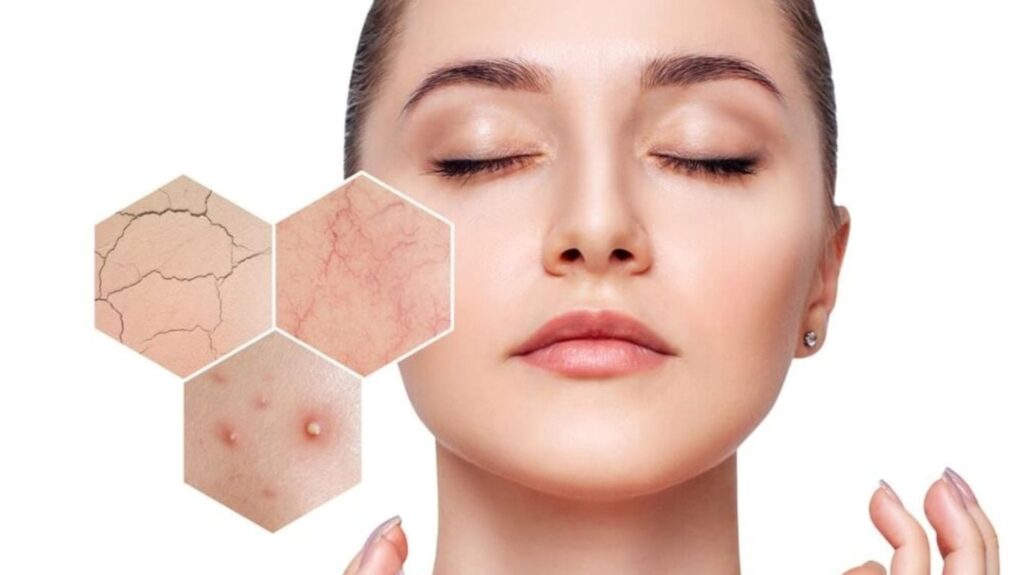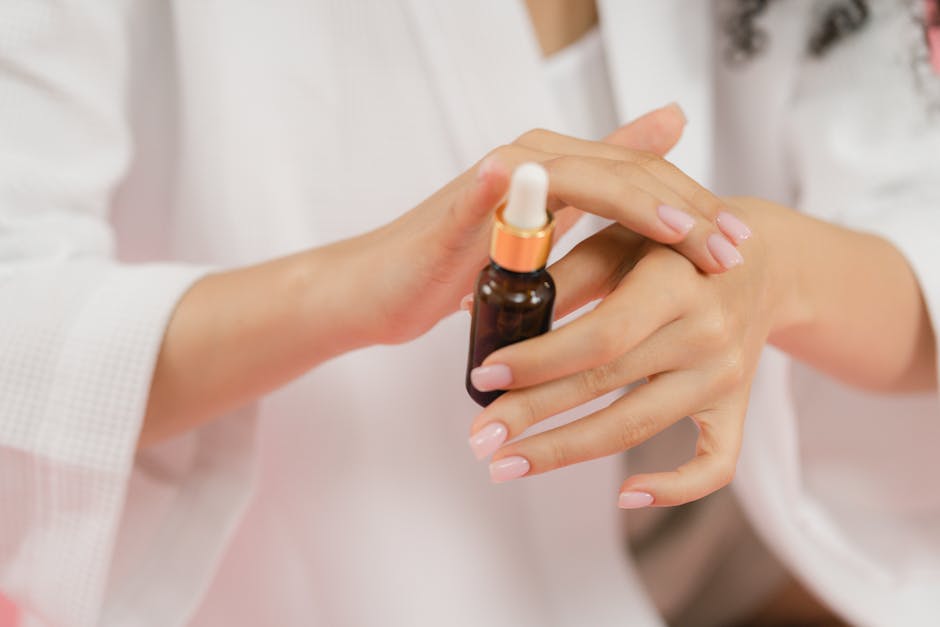What is Sensitive Skin?
Understanding the importance of a proper skincare routine for sensitive skin is crucial. Sensitive skin, characterised by its low threshold to irritants and an impaired barrier function, reacts quickly and visibly to various factors. These reactions, such as redness, burning, dryness, or blemishes, occur because the skin’s outer layer—a critical barrier that protects from external irritants—is compromised. To manage these issues effectively, adopting a suitable skincare routine for sensitive skin is essential.
What does Sensitive Skin look like?
Recognising signs of sensitive skin is a crucial step that empowers you to treat it properly. Once you understand your skin type, you can follow the right skincare routine with confidence and control.
- Redness or blotchiness: The face may turn red, especially after applying products. This reaction, called erythema, reveals underlying sensitivity.
- Burning or stinging: Sensitive skin often experiences uncomfortable burning or stinging sensations even when using mild products.
- Dryness or flakiness: Loss of moisture due to a weakened barrier results in dry or flaky patches.
- Blemishes or bumps: Irritation can cause frequent bumps or scratches, though sensitivity itself is not acne.
- Tightness or discomfort: Sensitive skin often feels tight or uncomfortable, especially after cleansing with harsh products.
Dealing with Sensitive Skin
Sensitive skin reacts easily to environmental factors, products, and lifestyle choices. Identifying whether you have sensitive skin helps you prevent irritation and potential damage, so it is essential to follow a proper skincare routine. Acknowledge the stress-skin feedback loop; calming the mind can also quiet the dermis. Incorporating relaxation techniques, such as mindfulness or deep breathing, positions the routine as truly holistic.
The Skin Wall’s Job
The skin wall, composed of fats and proteins, plays a vital role in protecting sensitive skin. When this barrier is weak, irritants can enter and moisture can escape, leading to dryness and redness. Understanding this process helps you treat your sensitive skin with the care it needs, keeping it moisturised and protected as part of an effective skincare routine.
Mistakes People Make with Sensitive Skin
The typical mistakes people make with sensitive skin are listed below. According to a leading study, over 80% of dermatologists report encountering cases of overexfoliation in their clinics every week, underscoring the prevalence of this common skincare error. This data highlights the importance of understanding and avoiding such mistakes.
- Applying too much product can overwhelm the skin’s natural barrier, leading to irritation.
- Over-exfoliating tears micro-tears in the skin, accelerating transepidermal water loss and heightening sensitivity.
- Skipping sunscreen exposes the skin to harmful UV rays, weakening the skin’s barrier over time and increasing redness and irritation.
- Avoiding these mistakes helps keep your skin healthy. Proper guidance and a targeted skincare routine can prevent problems and improve the overall health and appearance of your skin.
Things Affecting Sensitive Skin
Understanding and avoiding common irritants is crucial for managing sensitive skin. These irritants can be categorised into three main groups: ingredients, environmental factors, and lifestyle habits. To prevent feeling overwhelmed, try swapping irritants for gentle alternatives instead.
1. Ingredients:
- Fragrances and essential oils
- Opt for fragrance-free and hypoallergenic products.
- Alcohol: Opt for formulas with natural humectants, such as hyaluronic acid.
- Sulfates: Use sulfate-free cleansers and shampoos.
- Acids: Consider gentle ingredients like lactic acid or aloe vera.
2. Environmental Factors:
Extreme weather, pollution, UV exposure, and stress can worsen sensitivity. Use protective creams, antioxidants, sunscreen, and stress reduction strategies.
- Extreme weather conditions: Use a protective barrier cream and layer your skincare to lock in moisture.
- Pollution: Include antioxidants like vitamin C in your regimen to protect the skin from free radicals.
- UV exposure: Always apply a broad-spectrum sunscreen.
3. Habits:
Over-cleansing, using hot water, and inconsistent routines can harm your skin. Stick to a gentle cleanser, use lukewarm water, and be consistent with your routine. Identifying and adjusting for specific triggers maximises skin health and care results.
- Over-cleansing: Opt for a gentle, hydrating cleanser and use it only when necessary.
- Using hot water: Use lukewarm water to cleanse the face.
4. Inconsistent skincare routine:
Develop a consistent routine tailored for sensitive skin. Identifying which specific triggers affect your skin can lead to a more effective skincare regimen and healthier skin overall.
Things That Make Sensitive Skin Happy
Fortunately, many ingredients soothe and strengthen sensitive skin. Ceramides play a crucial role in supporting the repair of the skin barrier.
Niacinamide: Niacinamide helps reduce skin redness and strengthens the skin wall.
Panthenol: Panthenol helps moisturise the skin and reduces skin irritation.
Oatmeal: Soothes and calms irritated skin.
Aloe: Cools and hydrates.
Consulting with a Skin Doctor for a Skincare Routine for Sensitive Skin
If your skin remains sensitive, it’s essential to consult a dermatologist. Many people try various products before consulting a doctor, but a professional can help you develop a routine tailored to sensitive skin. It may be a condition that requires medical attention, and a dermatologist can offer the best advice for your specific skin concern.
AM Skincare Routine for Sensitive Skin
At 6 AM, the first rays of sunlight stream through the curtains, and you notice your cheeks feeling tight and dry. This is the moment your morning routine becomes essential. If you have sensitive skin, an intense routine is crucial. Sun and pollution threaten your skin, but a straightforward start helps keep it protected, healthy, and prepared for the day.
Step 1: Soft Wash
Start with a very gentle, fragrance-free cleanser. Overnight, your skin accumulates oils and sweat. Washing them off helps your products work better—avoid rough exfoliants or highly foaming cleansers.
Step 2: (Maybe) Toner or Essence
If your skin feels tight after cleansing, consider experimenting with a toner that includes mild, beneficial ingredients. Try using it for a week and observe if there is an improvement in your skin’s comfort levels. If your cleanser leaves no tightness, you may choose to skip this step, adopting a minimalist approach that is essential for sensitive skin care. By framing this as a low-risk test, you empower personalised discovery and can adjust your routine based on what works best for you.
Ingredients your Toner should have:·
- Alcohol Free
- A product containing chamomile
- A product containing aloe vera
Step 3: Serum
For your morning sensitive skin routine, a high-quality serum from a reputable brand helps hydrate and repair the skin. To avoid overuse and ensure your skin benefits optimally, start with a low concentration of active ingredients. For example, with niacinamide, consider using a formulation that begins at a 2-3% concentration to provide gentle care without overwhelming your skin.
Key Point of Skincare routine for sensitive skin:
A gentle morning routine should hydrate, protect, and comfort sensitive skin. Simple products designed for sensitive skin help maintain comfort throughout the day. What to Look for in a Soft Wash Product:
- No perfume
- Won’t clog pores
- No sulfates
- Ingredients like glycerin or ceramides
PM Skincare Routine for Sensitive Skin
Sensitive skin requires a targeted nighttime routine. Night allows the skin to repair and rejuvenate after exposure to the elements throughout the day. Permeability increases, letting the skin absorb nourishing ingredients. As the skin is not exposed to external stressors overnight, nutrient delivery is enhanced. Additionally, nighttime is crucial for supporting the skin’s microbiome, as sleep promotes microbial balance that helps maintain the skin’s barrier function. Using strengthening products at night can significantly boost skin condition, making a quality nighttime routine vital for sensitive skin.
Step 1: Soft Cleansing
For your nighttime routine, use a gentle, effective cleanser to remove buildup. Select a creamy or gel formula that contains soothing ingredients such as glycerin, panthenol, or aloe vera. Avoid cleansers containing alcohol, sulfates, or fragrances, as they can cause stinging, dryness, or irritation to the skin.
Step 2: Serum (Maybe a dab)
Sensitive skin typically benefits from simple products, but when using a serum, opt for one specifically designed to soothe and repair sensitive skin. Niacinamide (at a low concentration), hyaluronic acid, or Centella asiatica help boost hydration and calm redness.
Best Products for Sensitive Skin
Before trying new skincare products, it’s essential to perform a 24-hour patch test to ensure compatibility and prevent adverse reactions. This step helps identify potential sensitivities. Consider these products for sensitive skin care. They are user-friendly and contain proven calming ingredients.
- Paula’s Choice Enriched Calming Toner: This gentle and mild option is formulated with plant extracts and antioxidants to calm sensitive skin. A study highlights that its inclusion of chamomile extract at a 1% concentration effectively reduces irritation for many users.
- La Roche-Posay Hyalu B5 Serum: It provides even more water and contains madecassoside to help soothe and calm your skin.
- Serum: The Ordinary Hyaluronic Acid 2% + B5: This serum delivers moisture and retains hydration. It’s lightweight, oil-free, and free of alcohol, silicone, or fragrance—ideal for sensitive, moisture-deprived skin.
- La Roche-Posay Thermal Spring Water: It’s a gentle mist that calms and refreshes sensitive skin with its mineral-rich formula.
- Avene Cicalfate+ Restorative Protective Cream: Loved for soothing irritated skin, it’s beneficial after exfoliation or irritation.
- Cetaphil Gentle Skin Cleanser: Frequently recommended by doctors for sensitive skin. It is soap-free and fragrance-free, helping balance the skin.
- Hydrating Serum: Keeping sensitive skin hydrated is key. A serum can improve your skin’s appearance and reduce redness.
- Toner (alcohol-free): Use a calming, alcohol-free toner to balance your skin after cleansing and prepare it for moisturiser. Avoid harsh ingredients or synthetic fragrances.
Conclusion: Skincare Routine for Sensitive Skin: AM vs PM
Sensitive skin takes time and care. Knowing what causes it, what it looks like, and what makes it mad, you can help it. Finding it early, using gentle stuff, and living right is the key. Serums that bring moisture, mainly if they have hyaluronic acid, can trap moisture and stop dry skin. You need a moisturiser if you have sensitive skin. With the right stuff, even the most sensitive skin can get happy over time. Unlike other skin types, it responds better to calming treatments.
To start making a difference today, swap just one of your current products for a fragrance-free alternative tonight. This simple change could mark the beginning of a journey toward healthier, happier skin.


